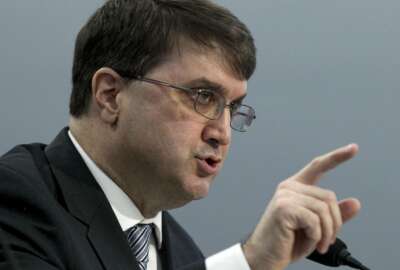

The Government Accountability Office has completed a detailed study of three private citizens and what influence they might have had on decisions made by the...
Best listening experience is on Chrome, Firefox or Safari. Subscribe to Federal Drive’s daily audio interviews on Apple Podcasts or PodcastOne.
The Government Accountability Office has completed a detailed study of three private citizens and what influence they might have had on decisions made by the Department of Veterans Affairs. The people involved here were members of President Donald Trump’s at Mar-a-Lago club in Florida. With highlights of the interactions of Bruce Moskowitz, Isaac Perlmutter and Marc Sherman, the GAO’s Managing Director for healthcare issues Nicole Clowers joined Federal Drive with Tom Temin.
Interview transcript:
Tom Temin: Ms. Clowers, good to have you on.
Nicole Clowers: Great to be here. Thanks for having me.
Tom Temin: So this study concerns an issue that was somewhat controversial a couple of years ago. Is it accurate to say the GAO is not there to make any inference of whether this was right or wrong, but simply to document for those requesting members of Congress what exactly happened? That a fair way to put it?
Nicole Clowers: That’s very fair. The goal of the audit was to describe the interactions of the three private individuals, with VA officials and their role in VA decision making.
Tom Temin: Alright, and what are your top level findings? Did they have communications and were they involved?
Nicole Clowers: What we found is that from the end of 2016, through about mid 2018, we found incidences of frequent communication and involvement by the three individuals with senior level VA officials in five key areas. Those areas included the development of the electronic health records contract with Cerner, senior level personnel decisions, a mobile app development effort, a VA suicide prevention effort, and an effort to create a medical device registry. And we found that the interaction took a number of different forms from email to phone calls to in-person meetings.
Tom Temin: And who was it within VA that they communicated with?
Nicole Clowers: It was typically very senior level officials, so those included at the time former Secretary Shulkin, the former deputy secretary, the former chief of staff, as well as the former CIO and undersecretary for health.
Tom Temin: Did they have any communications with career staff at VA, even Senior Executive Service members who we know?
Nicole Clowers: What we saw in our review document was primarily the very senior level officials, but certainly the senior level officials would pull in career level VA personnel to help maybe respond to questions from the three individuals or provide information. So we did see that type of information in email exchanges, but the direct communications were really with the senior level officials.
Tom Temin: And what do we know about these individuals? That is to say Moskowitz, Perlmutter and Sherman. Do they have particular expertise in some of these areas like suicide prevention or electronic health records or development of apps?
Nicole Clowers: When President-Elect Trump announced that he was having some experts from outside of VA help with him on VA matters it was in January of 2017. And he described these officials of having either business success being involved in large organization turnarounds, or in the case of Dr. Moskowitz, being a physician, a practitioner, and would be bringing that expertise.
Tom Temin: Got it. And is that totally unusual for the president, any president to pick people from industry that he might know to advise senior officials that have been appointed by the White House?
Nicole Clowers: Well, what we know from talking to DEA officials is that they often will seek external opinion and advice on a range of matters. We only focus on this particular incident at VA and with these officials, and private citizens, but in our conversations, we did talk to VA’s general counsel as well as their ethics folks, and we got a good understanding of the trainings that’s provided, the policies and guidance that’s provided, and found through the course of our work that VA does interact with private citizens or other organizations to learn best practices, for example, or to obtain feedback and advise on their initiatives.
Tom Temin: We’re speaking with Nicole Clowers. She is managing director for health care issues at the Government Accountability Office. And were you able to determine whether those gentlemen had influence on the choices VA made? I think the most important one perhaps, might have been a multi billion dollar, multi year contract at Cerner -a decision that was announced by David Shulkin, the secretary at the time. Who today contends that went through all the normal contracting processes. So what did you find with respect to influence or decisions made with respect to the involvement of those three people?
Nicole Clowers: For our report, we didn’t make an assessment on influence, but rather we focused on the interaction. And what I can share in terms of the interactions, they were frequent and took many different form. And the timing of the interactions vary by initiative. What we did do is we did talk to officials, as well as the three individuals talking to their representatives to get their views on the extent to which the three individuals had influence on decision making. From the VA perspective, we found that the opinions varied to the extent to which they believed there was influence. At least one current VA official said that he did not believe it was any type of impact or influence and talking to and getting views of several former VA officials. They did feel like there was some level of influence in fact, one of the former officials described the three as creating a somewhat shadow reporting structure, and through which they would often have to bring the three individuals along at any any decisions that they were making. And they described that as a time-consuming process that sometimes led to some confusion, as well as frustration. With that said all the VA officials, both current and former, were very clear that they believed that the ultimate decisions that they made – they made on their own, and that they were free to make the decisions that were the best interest of the VA. As for the three individuals in attaining their views, they believe that their role was informal, that they had no direct or formal decision making authority and that they were only providing advice and recommendations to help be a move forward in different areas.
Tom Temin: Interesting and how did this all come to an end?
Nicole Clowers: The interactions ended at different points based on the initiative. You’ve mentioned, the Cerner contract where we saw a good amount of interaction during the timeframe of about November 2017 through the spring of 2018 when the contract was signed. The three individuals had a number of comments on the contract and the decision to move forward with the contract and was offering their perspective on it. But of course, after the contract was signed, those interactions have faded away. So it happened at different points. But what we saw through our documentation, review all communication wrapped up or ended in the spring of 2018.
Tom Temin: And did GAO make any recommendations in connection with this report?
Nicole Clowers: We did not make recommendations but in addition to providing narrative in terms of what we found, we provide detailed timelines for each of the five initiatives that I described earlier, where you can see a reader can see the types of interactions that were occurring, as well as how the interactions occurred and what was being communicated.
Tom Temin: Got it. So is the matter pretty much over at this point?
Nicole Clowers: For us it is – we’ve issued our report and you can find it at www.gao.gov.
Tom Temin: I guess I should also ask who were the major requesters of this report, because I think for them, there might be some political implication even though for Gao is playing it straight here.
Nicole Clowers: The requesters for this were Ranking Member Schatz and Senator Warren.
Tom Temin: Alright. Nicole Clowers is managing director for health care issues at the Government Accountability Office. Thanks so much for joining me.
Nicole Clowers: Thanks so much for having me.
Tom Temin: We’ll post this interview along with a link to her report at Federal News Network.com/FederalDrive. Hear the Federal Drive on demand. Subscribe at Apple Podcasts or Podcastone.
Copyright © 2025 Federal News Network. All rights reserved. This website is not intended for users located within the European Economic Area.
Tom Temin is host of the Federal Drive and has been providing insight on federal technology and management issues for more than 30 years.
Follow @tteminWFED



